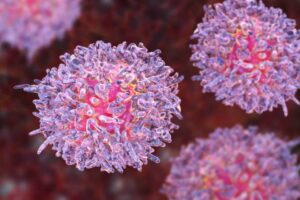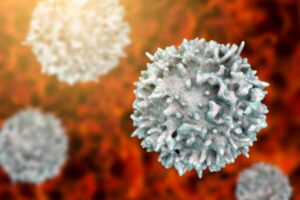Parkinson’s disease (PD) is the second most common neurodegenerative disorder that affects 1 million people in the US and 10 million worldwide.[1] Dopaminergic neuron destruction and accumulation of Lewy bodies (deposits of abnormal alpha-synuclein protein) in the substantia nigra of the midbrain are pathologic characteristics of PD.[2] However, recent research has implicated the role of T-cell dysregulation in the early pathogenesis of Parkinson’s disease.
Specifically, elevated numbers of CD4+ and CD8+ T cells are found in the ventral midbrain of patients with Parkinson’s disease when compared with healthy patients. Also, abnormal alpha-synuclein can induce T-cell immune responses.

Role of Adaptive Immune System in Parkinson’s Disease
In order to determine the role of the adaptive immune system in early PD development, a collaboration of scientists from the University of Alabama at Birmingham examined cytokine production and surface markers in CD4+ T cells, CD8+ T cells, and CD19+ B cells in patients with early-stage PD and healthy controls.[3]
Peripheral blood was collected from patients with PD and healthy controls, and peripheral blood mononuclear cells were analyzed for intracellular cytokine production and surface markers via flow cytometry. The study results showed that naive CD4+ and CD8+ T cells are decreased in patients with PD, but central memory CD4+ T cells are increased.
T helper cells that produce IL-17 and IL-4 and CD8+ T cells that produce IFN-gamma are increased in patients with PD. CD19+ B cells producing TNF-alpha were also found to be increased in patients with PD. Also of note, the changes seen in the CD4+ T cells and B cells correlated with severity of motor disease.
Implications for PD Treatment Approaches
Available treatment approaches for patients with PD are based primarily on dopamine replacement to help manage motor symptoms and the addition of other drugs to address common non-motor symptoms, but they do not address the underlying mechanisms associated with the progression of PD.
The information provided by the study results may form the basis to develop PD immunotherapies that target T-cell dysregulation. Better understanding of the pathogenesis of PD can improve therapeutic design and patient outcomes.
Future longer-term studies could yield additional insight into immune cell and cytokine profiles associated with PD progression. The link between alpha-synuclein and immune responses can be exploited to develop personalized approaches to PD therapy and to determine potential response to therapy.
Conclusion
Parkinson’s disease is a severe neurodegenerative disorder that affects quality of life for millions of people worldwide. Although there is no cure for PD today, researchers are making progress in identifying the underlying pathogenesis and developing therapies for the disease.
Expanded knowledge concerning the role of the adaptive immune system at various stages of PD can provide insight into a means to halt or slow progression of the disease, and ultimately lead to higher quality of life for patients.
References
Neurol Neuroimmunol Neuroinflamm Sep 2021, 8 (5) e1036; DOI: 10.1212/NXI.0000000000001036





